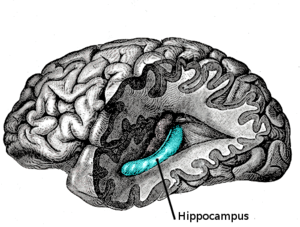 Image via Wikipedia
Image via Wikipedia
Professor Eleanor Maguire led this Wellcome Trust-funded study, an extension of work published last year which showed how spatial memories - in that case, where a volunteer was standing in a virtual reality room - are recorded in regular patterns of activity in the hippocampus, the area of the brain responsible for learning and memory.
"In our previous experiment, we were looking at basic memories, at someone's location in an environment," says Professor Maguire. "What is more interesting is to look at 'episodic' memories - the complex, everyday memories that include much more information on where we are, what we are doing and how we feel."
To explore how such memories are recorded, the researchers showed ten volunteers three short films and asked them to memorise what they saw. The films were very simple, sharing a number of similar features - all included a woman carrying out an everyday task in a typical urban street, and each film was the same length, seven seconds long. For example, one film showed a woman drinking coffee from a paper cup in the street before discarding the cup in a litter bin; another film showed a (different) woman posting a letter.
The volunteers were then asked to recall each of the films in turn whilst inside an fMRI scanner, which records brain activity by measuring changes in blood flow within the brain.
A computer algorithm then studied the patterns and had to identify which film the volunteer was recalling purely by looking at the pattern of their brain activity. The results are published in the journal Current Biology.
"The algorithm was able to predict correctly which of the three films the volunteer was recalling significantly above what would be expected by chance," explains Martin Chadwick, lead author of the study. "This suggests that our memories are recorded in a regular pattern."
Continue Reading
![Reblog this post [with Zemanta]](http://img.zemanta.com/reblog_b.png?x-id=2e9a06b8-688c-4435-a33a-8fc962e02d81)
No comments:
Post a Comment